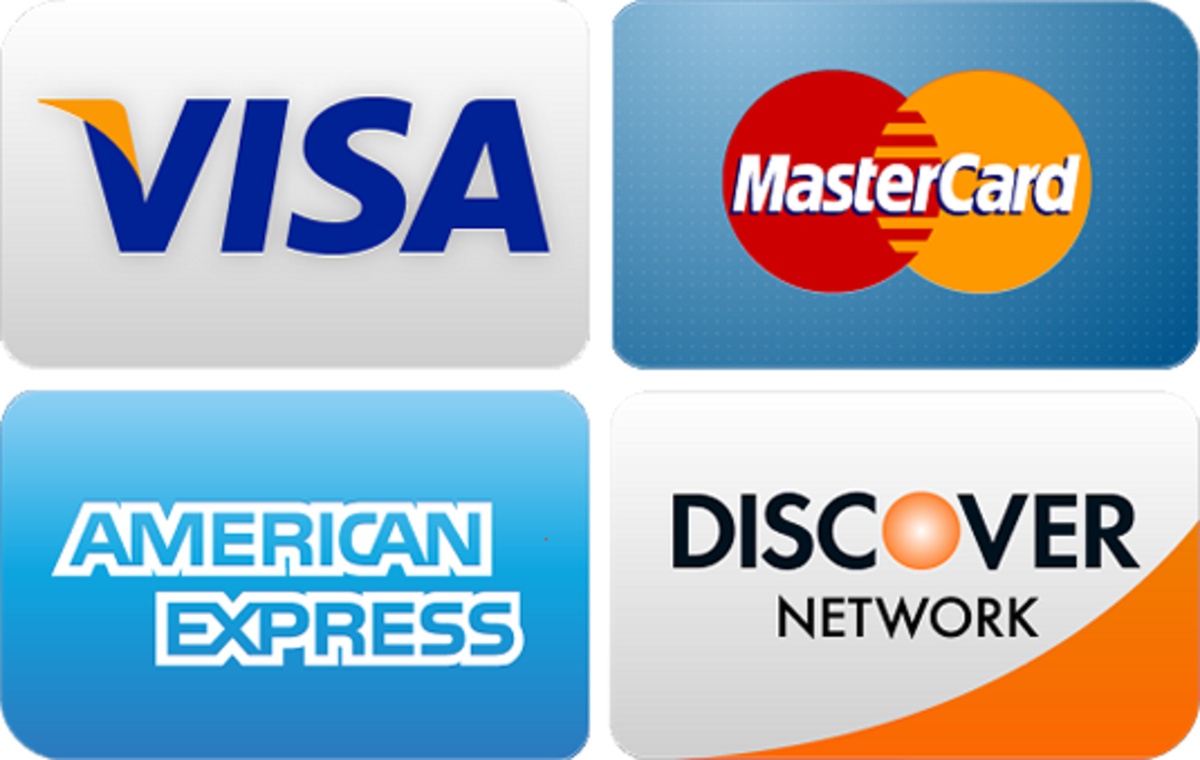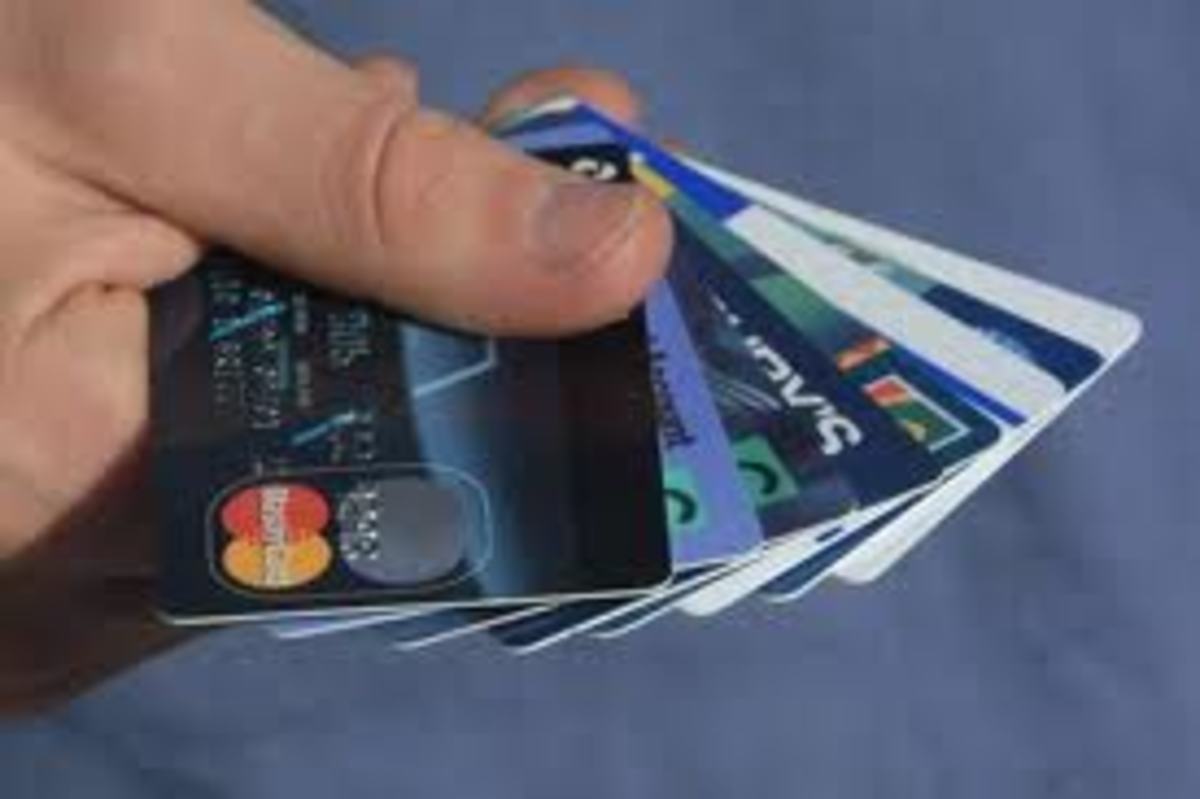Improve Your Personal Finance By Understanding Credit Cards

The Credit Card Trade
Credit cards have become a financial horror in the United States in the 2000s and 2010s, because of increasing interest rates, service fees, late fees, and over-line penalties. At the same time, conspicuous consumerism in the media is urging the American Public from Skid Row to Wall Street to buy more products and services.
Advertising is driving people into a credit card lake of fire. We could certainly use the Old Testament Hebrew tradition of erasing all debts every 7 years.
Freedom
"The Hebrew word deror is derived from the Babylonian andurarum, and implies not only the cancellation of debts but the freeing of slaves as well. Consumers can become enslaved by credit cards.

"Credit History"
Charge cards were first issued in the 1920s by gasoline service stations, department stores, and hotel chains when automobiles and car vacations became popular. The cards worked from city to city without a bank visit to withdraw funds from accounts. I remember that my father kept a stack of envelopes on his desk at home that contained credit cards he had received without ever applying. He kept the stack for a couple of decades as a souvenir and then tossed it out. He paid cash for everything, including automobiles, except the house. The credit card boom began in earnest in the 1970s - see the Time Magazine link below.
Comedy of Financial Errors
My father paid cash for everything, except the house. He managed money well, saved, and even paid cash for new automobiles. He usually had three cars at once of different ages, reach maintained for 20 years. A few oil companies and department stores sent him unsolicited credit cards, but he destroyed every one of them. As a child I could not figure what they were. I only knew that in a TV rerun of the I Love Lucy, people were singing and dancing while making a commercial for a 1950s' department store Charge-A-Plate. I did not understand.
My first credit card was with the F & R Lazarus company, a large, long-lived precursor ro Federated Department Stores that was absorbed by Macy's. I made a purchase of $7.00, but never received the first credit card statement. I went to the credit office, where they found they had mailed the statement to an unrelated address in error. Even so, additional interest was added to my statement by a smirking clerk twice my age. I decided on the spot that credit cards were a racket facilitated by agism.
Trying just a few additional cards from other companies, my negative opinion became more deeply engrained. Another customer’s payment was credited to my bill for one card, and another customer’s purchases were charged to one of my other few cards. This was not very efficient and not good customer service. One oil company used to offer merchandise in their credit card billing literature and when the first product I received arrived broken, I swore off that gimmick as well. Keeping track of payments and due dates was an aggravating time-waster as well that I did not enjoy. One card found a way to charge interest, no matter how early you paid the bill -- To test this once I had completely paid off a bank card, I made a small purchase at the beginning of a biling cycle; then I paid it in full the next day - I received a bill for a full month's interest at the end of the billing cycle. A complaint brought no relief, so I paid the amount, detroyed the card, and changed banks.
When I discovered debit cards, I had no further use for credit cards, because my objective was to carry lesser amounts of cash and to use a card for purchases and receipts. I have not since used a credit card. My favorite banks in town today get to know all their customers by first name, offer more than enough glad customer service, attend to all requests and issues immediately, are open 7 days a week, and do not issue credit cards (bank loans only, with reasonable interest rates).
Unadvertised Limit
A colleague in another state received a new credit card in 2009 and charged very few purchases. Suddenly, his interest rate was 32% annually. One day, his card was denied – the company had cancelled his account without notice, but he was paid up to date and not over his limit. A TV news report soon after explained that consumers are now subject to cancellation and higher interest rates and service fees whenever their total charges reach an amount equal to only 20% of their credit card limit. Further, if they shop Big Box, grocery, and discount stores with their credit cards, they are also subject to the same rate hikes.
This means that of you have a credit car with a $2,000 limit, you can amass charges of no more than $400 and that $400 includes the next month’s upcoming interest and service fees, if any. This means that using only $350 total of the credit limit and paying it off totally before the statement arrives is the best practice. Even if you keep one credit card for emergencies, charging above 20% of the limit can result in increased rates and fees. In addition, you cannot maintain lower interest rates and serice fees if you use your credit card at WalMart, grocery stores, Big Lots, The Dollar Store, and similar retail outlets, according to several media outlets.
PrePaid Pain
I tried a $100 prepaid credit card once in order to see how it worked. It was difficult to activate, very difficult to use, and required several calls to the credit card customer service number with each purchase. I removed the money as soon as I could and never invested in another prepaid card.
High Risk and Discipline
Some high-risk credit card companies make credit cards available to individuals with poor credit, but at a cost of a large deposit and/or huge yearly service fee. Some of these cards allow only a draw against the amount deposited and after a certain period, offer an actual credit card. It’s a risky business altogether and ties up a large amount of money the consumer might need for necessities.
Train yourself to be immune to the media propaganda towards conspicuous consumption. There is a trend among some individuals and families to be bored, to eat too much, to spend too much, and to amass products they never use. Credit cards make this phenomenon easier to follow. Don't let this be you.
Younger workers can become enamored and even mesmerized by the phenomenon of having money and having so many places to spend it. One money-making technique of telecommunications carriers is to persuade consumers to sign up for automatic cell phone bill payments with a credit card number. Extra charges for cell phone services can amass, paid automatically without the consumer checking the billing or payment, with the possible result of credit card limits being passed, let alone the 20%-of-limit mark. This can lead to outrageous overages, fees, bills, cancelled credit cards, cancelled phone service, and rock bottom personal credit rating.
Interesting Information
- A Brief History of: Credit Cards - TIME
People used to say. "Charge it!" But today, many consumers think twice before pulling out the plastic. - Frontline: SECRET history of the credit card | PBS
The average American family today carries eight credit cards. Is that too many?

Example: More Credit Cards Than Income
I recall a story told by an acquaintance that graduated from college in the mid-1970s, when the Credit Card Rush was at in its peak. This happy young woman found full-time employment at $400/month, just above minimum wage and in a time of blatant gender wage discrimination. Regardless, her take-home pay was approximately $160 each two-week pay period. A little too happy with a new job, she accepted 9 credit cards from department stores and oil companies.
Charging moderate amounts on her cards during her first month of employment, but not tracking a monthly total, she was dismayed that in the middle of her second employed month, she owed $170 in minimum credit card payments, leaving her $10 in the hole. Fortunately, she had paid rent, utilities, etc. with the first paycheck and she worked in a restaurant that furnished employees' meals and health insurance. Her car insurance was paid 6 months in advance.
This person skipped payment on one of her credit cards (she should have alerted this company; I don't know if she did), applied that payment to another card to pay it off completely, and used only an oil company card for several months. She was down to 8 credit cards and caught up the missed payment during the following month. Subsequently, she paid off a card every month or two and reduced her credit cards to 1 bank card on which she consolidated the debt of two other cards with low balances and higher interest rates, 2 store cards, and 1 oil company card, for a total of 4. This all took a few months' time and was stressful. Keep track of your charges and payments due as compared to income!


A Better Solution
Avoid the Lake of Financial Fire
Credit cards today can require inordinate amounts of time and energy to control and may not be worth the hassle or the resulting problems. Interest rates in the 2010s reached incredible heights. Billing errors can compound an already risky enterprise on top of that.
Limit the number of credit cards you accept and use them judiciously. Avoid using them at all whenever possible. Save for larger purchases or use Layaway plans at the Big Box and department stores instead of using a credit card.
Be disciplined and do not use a credit card to purchase groceries. If you are having difficulty purchasing enough food, help is available. Consult your local social services agencies, county jobs and child/family services offices, churches, and other houses of worship, and your local food pantries.

Related Useful Information
- How to Understand Personal Finance When You Haven't a Clue
Before an individual can begin to grasp, understand, and develop a successful application of knowledge to Personal Finance, that person must understand a basic premise -- The premise to firmly understand encompasses the goal to become financially...









